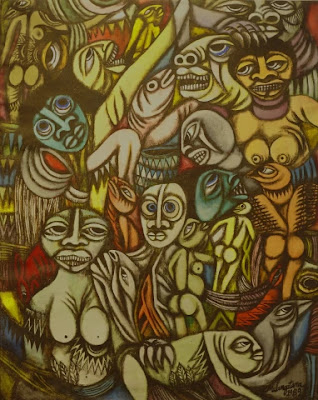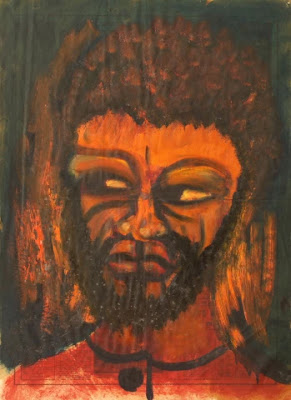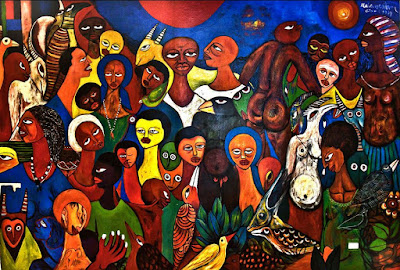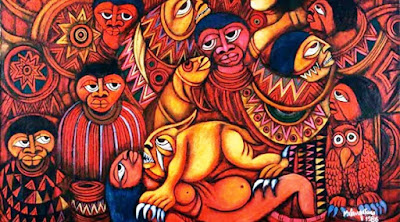Valente Malangatana Ngwenya was born in the small rural town of Matalana, southern Mozambique in 1936. His early years were spent attending mission schools and herding animals on farms. By the age of 12, Malangatana had moved to the capital Maputo and was working as a ball boy at a tennis club. It was here that Malangatana met Augusto Cabral and Pancho Guedes, who both became instrumental in his art education and his career as an artist. In 1959, Malangatana's works were exhibited publicly for the first time as part of a group show and two years later at the age of 25, he had his first solo exhibition. The show included the work Juizo Final (Final Judgment), which depicted the brutality of life under colonial rule. Much of Malangata's artistic work from this period to the early 1990's reflected the political turmoil of Mozambique. It was not until multiparty elections in 1994 that Malangatana's work began to depict a more hopeful phase in Mozambique's history.
Malangatana's support for Mozambique's independence struggle resulted in his imprisonment for 18 months for being a member of the Liberation Front of Mozambique, known as Frelimo. Shortly after his release in 1971, Malangatana travelled to Portugal on a Gulbenkian Foundation grant and studied ceramics and printmaking. His first solo exhibition in the country took place the following year in Lisbon. Malangatana spent three years in Portugal and returned to Mozambique just ahead of the country's independence. Following independence, Malangatana held several party political and government roles, including serving as a representative to parliament.
Also a published poet, Malangatana's poetry was included in the journal Black Orpheus and the anthology Modern Poetry from Africa in 1963. Malangatana's works have been exhibited around the world, including Portugal, India, Chile, France, London, Brazil and the USA. His works are also included in many public and private collections. Malangatana was awarded the Nachingwea Medal for Contribution to Mozambican Culture and in 1997 was named a UNESCO Artist for Peace. He was active in establishing Mozambique's cultural institutions, including the National Museum of Art, the Centre for Cultural Studies and the Centre for the Arts.
Valente Malangatana Ngwenya died in Matosinhos, Portugal in 2011.
Chamo-me MALANGATANA VALENTE NGWENYA. Nasci em Mapulene, que fica em Matalana, no distrito de Marracuene...Quando nasci deram-me o nome de Malangatana, o Valente vem depois de eu crescer, e Ngwenya é o meu apelido, toda a minha família tem este nome. Cresci na zona de Matalane, onde vivi sobretudo com a minha mãe e, de vez em quando, com o meu pai. O meu pai era mineiro. Trabalhava na África do Sul pelo que vinha poucas vezes a Moçambique. Mas, quando vinha, tanto podia ficar 3 meses como mais ou menos tempo. Cresci, pois, sob os cuidados da minha mãe."
UNTITLED, 2009 93 x 71 cm
124 x 124 cm
121 x 147 cm
1993 - 128 x 179 cm
1991 - 120 x 100 cm
1989 - 100 x 78 cm
1985 - 120 x 130 cm
1983 - 130 x 120 cm
1973 -58 x 121 cm
1972 - 60 x 43 cm
'Sol nascente'' obra de 1986
Hoje o mundo comemora o dia das bruxas. Abaixo, em especial para vocês, a obra obscura ''Monstros Grandes Comendo Monstros Pequenos'' de Malangatana
1992

































Sem comentários:
Enviar um comentário